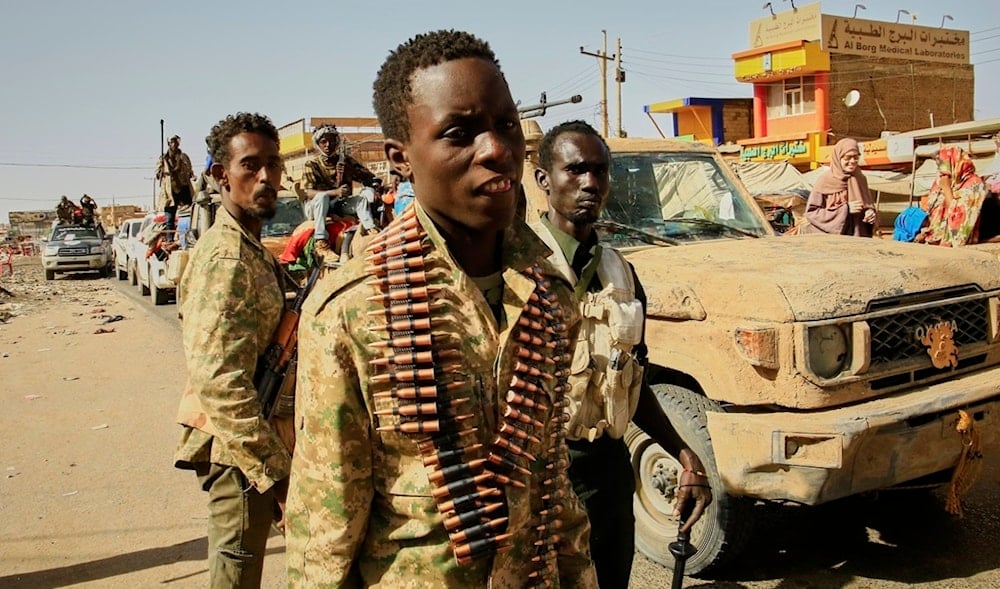Arab divisions undermine London talks on ending Sudan war
Disagreements between the UAE, Egypt, and Saudi Arabia stall efforts at a London summit to find a unified path toward ending Sudan’s war, now in its second year.
-

Soldiers arrive to the Allafah market, in an area recently recaptured by Sudan's army from the Rapid Support Forces paramilitary group, in the Al Kalalah district, 40km south of Khartoum, Sudan, Thursday, March 27, 2025 (AP)
A top Emirati diplomat expressed disappointment to Reuters at the failure of a UK-hosted summit this week to produce a unified strategy to end the Sudan conflict, now in its second year.
The conference in London, intended to build regional consensus, ended without a joint communique due to disagreements between the UAE, Egypt, and Saudi Arabia over Sudan’s future governance, according to diplomatic sources.
"There was a clear call from us that we needed unity around, you know, an urgent need first and foremost that Sudan should transition to an independent civilian-led government," said Lana Nusseibeh, assistant minister for political affairs at the UAE's Ministry of Foreign Affairs.
"And that's why ... we were very disappointed that despite the gravity of the situation and the UK's efforts, we were unable to agree on a joint communique yesterday."
Regional tensions surface over civilian-led governance
Both the Sudanese army and the paramilitary Rapid Support Forces (RSF) have received backing from regional players, making Arab unity critical to any resolution.
However, divisions persist. At the London summit, Sudan’s government protested the inclusion of countries it has accused of supporting the RSF, particularly the UAE.
The summit also included Egypt and Saudi Arabia, which have ties to the Sudanese army and have played roles in prior, unsuccessful peace talks.
Two Egyptian security sources said disagreements arose over whether to prioritize the establishment of a civilian-led government or to first end hostilities, leaving governance to be addressed later.
Egypt, KSA align against joint statement
One diplomat present said the disagreement was rooted in wording around state institutions. Egypt reportedly advocated for language that was seen by others, including the UAE, as legitimizing the military leadership. Saudi Arabia supported Egypt’s position.
The failure to reconcile these differences ultimately blocked the release of a unified communique, the source said, and cast doubt on the prospects of future cooperation.
Requests for comment from the Egyptian Foreign Ministry and the Saudi government communications office were not immediately returned.
Sudan accuses UAE of violating Genocide Convention in Darfur
It is worth noting that the Sudanese government informed the International Court of Justice (ICJ) last week that the United Arab Emirates was violating the Genocide Convention by supporting paramilitary forces in Darfur. Sudan has requested that the court issue urgent provisional measures.
According to Reuters, Sudan’s complaint to the Hague-based ICJ concerns intense ethnically-driven attacks carried out by the Rapid Support Forces (RSF) in West Darfur. The UAE has dismissed the case as a "political game".
Acting Sudanese Justice Minister Muawiya Othman told the UN’s top court, "The genocide against the Masalit people is being carried out by the Rapid Support Forces, believed to be Arabs from Darfur, with the support and complicity of the United Arab Emirates."
Sudan has accused the UAE of arming the RSF amid a civil war that has dragged on for two years. Although the UAE denies these allegations, UN experts and US lawmakers have found them to be "credible."
Sudan’s acting justice minister has also called on the court to issue an order preventing the UAE from continuing acts of genocide against the Masalit.
Read more: RSF establishes rival Government in Sudan with allied factions

 3 Min Read
3 Min Read










